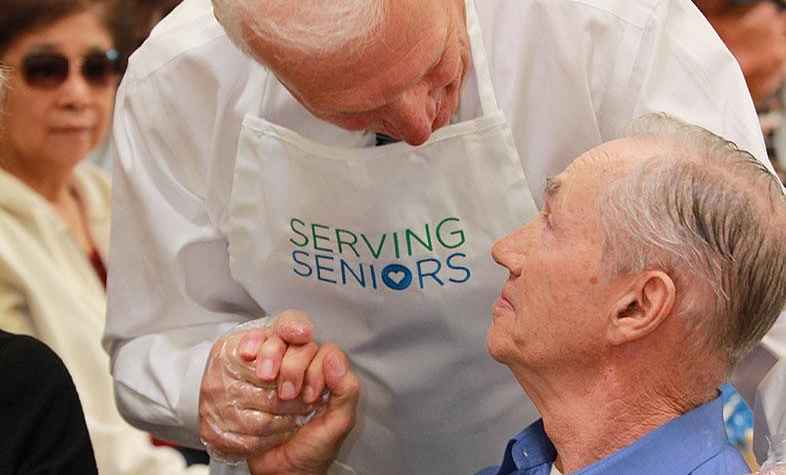





See listing of Recent and Most Popular articles on the Home Page
Serve
Category: Volunteer / Topics: Bible • Charity • Christian Life • Compassion • Faith • Service • Volunteer
Helping the Needy
by Stu Johnson
Posted: June 6, 2018
Testing our obedience to biblical commands…
No.20 in the Thursday Morning Guy’s group series (see list)
Once again, I report from the Thursday Morning Guys group I’ve been attending at a local church. Each week one of the guys suggests a topic for discussion. The blogs that result are not minutes from the session, but an attempt to glean useful themes, to which I may add my own insights. The topic at the May 15 session focused on our obedience to biblical commands to help the needy among us.
THE DISCUSSION STARTER
Topic suggested by one of the guys, shared in an email the night before
The leader for the topic included a PDF document with Bible references (see “Guidance from Scripture” at the bottom of this page), to which he posed two questions:
- How do I [we] obey in thought, word & deed these commands?
- How do I [we] disobey in thought, word & deed these commands?
THE CONVERSATION
The discussion led off with examples of personal or church involvement in food pantries, assistance for the homeless (in our area a coalition of churches rotates overnight shelter for the homeless in coordination with a community social service agency), personal help for individuals, and other forms of help. This then led to a discussion of the shifting responsibility from community-based support to the social safety net of today, with heavy government involvement.
Before government became involved, benevolence in America was provided by churches, church-supported organizations, immigrant and community social groups, labor unions, private service organizations and charities.
The situation today, while providing more stability than possible before, does make it easier to consider help for the needy as a “checkbook ministry”—give money and get a tax-deduction in the process! Even at the church level, it is often easier to commit money to another organization providing services than it is to get the congregation involved. As several said, much is being done in the way of volunteering and personal involvement, but much more can and must be done.
Another important factor to consider is the tremendous change in family structure, especially in the decades since World War II. Prior to that, it was common for multiple generations to live with or near each other and it was not unusual for the oldest generation to be cared for by their children. With World War II came exposure by millions to a wider world that was then met with changes back home that made it easier to relocate to more distant locations. Nearly everyone at the table could tell such a tale.
When I grew up in Chicago, for example, my father’s siblings all lived within four blocks of each other on the same street. Even as the adults began to scatter to different suburbs, my cousins went even further afield and now our own children and grandchildren live far from us. (We envy our friends who still have family nearby). Add to these changes the increased divorce rate and its impact on family structure—blended families, single-parent households—along with many other changes. We are in a far different place, with a host of new issues and needs, than most of us grew up in.
Providing help today is often made complex by sensitivities and regulations that were not present in our youth. For example, one of the guys talked about the problem of reaching out to women in need of encouragement or counsel. While one-on-one contact is often best, much greater care is required today. Many churches have adopted specific policies for those working with youth and other settings that represent potential problem areas. This may involve background checks and formal training.
The biblical mandate to help absolutely cannot be ignored, but does need to be adapted to the situation today, often with common-sense solutions available (no closed-door one-on-one meetings, using two or more people, asking others to address a need when your own involvement might raise questions, etc.). While it may require jumping through more hoops, or passing responsibility to someone else, remember that we still represent the hands and heart of Jesus, extended to help another human being.
What personal experiences or observations can you add?
PRINCIPLES PROPOSED
I will suggest four. You may have others you would add.
God's concern for the downtrodden requires our response
See the Guidance from Scripture section below. Examine the individual references as well as the topical guide to see the enormity of God’s concern for the less fortunate and oppressed. Notice that these are not simply sayings that indicate God’s concern for these people; most are commands for God’s people (the Israelites under the Old Covenant and the church of Jesus Christ under the New Covenant) to show God’s love by the way they treat and fight for the disadvantaged. While they are commands for believers, they also present high standards that apply to human society in general.
Be sensitive to the needs around you
As one of the men in the group pointed out, Paul addressed an early crisis in the church—the care of widows. Yet, notice how many Old Testament passages appear in the Guidance from Scripture section—the problems addressed in the New Testament were not new, but part of the broken relationship with God that started in the Garden of Eden at the very start of the Bible’s overarching story of sin and redemption.
Even today, with a much stronger social safety net, many people are reluctant to make their needs known—they may be embarrassed or have other reasons not to discuss a genuine need. Churches have an opportunity to provide help in a sensitive and anonymous way, often administered by men and women fulfilling the biblical duties of deacon. In addition to providing monetary help, examples were given in our conversation of ways that people can connect to meet specific needs, such as grocery shopping, transportation, visiting to help alleviate loneliness, prayer, etc. It is necessary in today’s climate to develop appropriate policies and practices while addressing these needs.
A clarion call for involvement—become a volunteer
As several pointed out, most churches are helping in various ways, but more can and should be done. More needs to be said from the pulpit and in other ways to constantly remind everyone of the high call to help those in need.
Many of you reading this blog on SeniorLifestyle.org may be retired. Back in 2006 I was serving as a consultant to the Senior Evangelism Partnership, spearheaded by Fairview and Covenant Retirement Communities. Researching the demographics of American seniors, it was obvious that an “age wave” (described by board member Charles Arn) was providing, among other things, the potential for a vast army of volunteers, made up of people with diverse experience, expertise, and time. At no time in American history has such a great resource been available. What are you doing to be part of this great movement?
See the big picture—become an advocate
While the guy’s conversation centered on helping primarily with physical and financial needs (the “widows and orphans” appeal), the subject goes much deeper than that. This has been revealed in this and previous discussions—and is evident in the topic list included in the Guidance from Scripture below—in relation to the church’s and individual’s roles in care for the bereaved, exploitation of others, treatment of foreigners, oppression, poverty, human rights, social justice, and the treatment of strangers. This is all summed up in Isaiah 1:17 (NLT):
Learn to do good. Seek justice. Help the oppressed. Defend the cause of orphans. Fight for the rights of widows.
What principles can you add from what you have learned, observed, and applied to your life?
GUIDANCE FROM SCRIPTURE (God’s written Word, the Holy Bible)
The leader for the day provided a resource listing both individual and topical references. The verses are presented here in the New Living Translation (NLT), but you can click on the link and see other translations, the context, or find other resources on BibleGateway.com.
VERSES (In order found in the Bible):
- “You must not exploit a widow or an orphan. If you exploit them in any way and they cry out to me, then I will certainly hear their cry. My anger will blaze against you, and I will kill you with the sword. Then your wives will be widows and your children fatherless.” (Exodus 22:22-24)
- He ensures that orphans and widows receive justice. He shows love to the foreigners living among you and gives them food and clothing. (Deuteronomy 10:18)
- At the end of every third year, bring the entire tithe of that year’s harvest and store it in the nearest town. Give it to the Levites, who will receive no allotment of land among you, as well as to the foreigners living among you, the orphans, and the widows in your towns, so they can eat and be satisfied. Then the Lord your God will bless you in all your work. (Deuteronomy 14:28-29)
- “If anyone kidnaps a fellow Israelite and treats him as a slave or sells him, the kidnapper must die. In this way, you will purge the evil from among you.” (Deuteronomy 24:7)
- “True justice must be given to foreigners living among you and to orphans, and you must never accept a widow’s garment as security for her debt.” (Deuteronomy 24:17)
- When you are harvesting your crops and forget to bring in a bundle of grain from your field, don’t go back to get it. Leave it for the foreigners, orphans, and widows. Then the Lord your God will bless you in all you do. (Deuteronomy 24:19)
- “Cursed is anyone who denies justice to foreigners, orphans, or widows.” And all the people will reply, “Amen.” (Deuteronomy 27:19)
- The wicked are too proud to seek God. They seem to think that God is dead. (Psalm 10:4)
- Father to the fatherless, defender of widows—this is God, whose dwelling is holy. (Psalm 68:5)
- The Lord protects the foreigners among us. He cares for the orphans and widows, but he frustrates the plans of the wicked. (Psalm 146:9)
- Don’t cheat your neighbor by moving the ancient boundary markers; don’t take the land of defenseless orphans. For their Redeemer is strong; he himself will bring their charges against you. (Proverbs 23:10-11)
- Learn to do good. Seek justice. Help the oppressed. Defend the cause of orphans. Fight for the rights of widows. (Isaiah 1:17)
- Your leaders are rebels, the companions of thieves. All of them love bribes and demand payoffs,but they refuse to defend the cause of orphans or fight for the rights of widows. (Isaiah 1:23)
- What sorrow awaits the unjust judges and those who issue unfair laws. They deprive the poor of justice and deny the rights of the needy among my people. They prey on widows and take advantage of orphans. What will you do when I punish you, when I send disaster upon you from a distant land? To whom will you turn for help? Where will your treasures be safe? You will stumble along as prisoners or lie among the dead. But even then the Lord’s anger will not be satisfied. His fist is still poised to strike. (Isaiah 10:1-4)
- “So I will go and speak to their leaders. Surely they know the ways of the Lord and understand God’s laws.” But the leaders, too, as one man, had thrown off God’s yoke and broken his chains. So now a lion from the forest will attack them; a wolf from the desert will pounce on them. A leopard will lurk near their towns, tearing apart any who dare to venture out. or their rebellion is great, and their sins are many. (Jeremiah 5:5-6)
- They are fat and sleek, and there is no limit to their wicked deeds. They refuse to provide justice to orphans and deny the rights of the poor. (Jeremiah 5:28)
- This is what the Lord says: Be fair-minded and just. Do what is right! Help those who have been robbed; rescue them from their oppressors. Quit your evil deeds! Do not mistreat foreigners, orphans, and widows. Stop murdering the innocent! (Jeremiah 22:3)
- “But I will protect the orphans who remain among you. Your widows, too, can depend on me for help.” (Jeremiah 49:11)
- Fathers and mothers are treated with contempt. Foreigners are forced to pay for protection. Orphans and widows are wronged and oppressed among you. (Ezekiel 22:7)
- Assyria cannot save us, nor can our warhorses. Never again will we say to the idols we have made, “You are our gods.” No, in you alone do the orphans find mercy. (Hosea 14:3)
- Do not oppress widows, orphans, foreigners, and the poor. And do not scheme against each other. (Zechariah 7:10)
- “At that time I will put you on trial. I am eager to witness against all sorcerers and adulterers and liars. I will speak against those who cheat employees of their wages, who oppress widows and orphans, or who deprive the foreigners living among you of justice, for these people do not fear me,” says the Lord of Heaven’s Armies. (Malachi 3:5)
- Pure and genuine religion in the sight of God the Father means caring for orphans and widows in their distress and refusing to let the world corrupt you. (James 1:27)
TOPICS:
- God’s Attitude toward Aliens
- Care for the Bereaved
- Exploitations
- Foreigners
- Oppressing Foreigners
- God’s Attitude Toward Oppression
- The Nature of Oppression
- Poverty
- Rights: How to Treat Other People
- Social Justice
- Strangers
About the Scripture references: unless indicated otherwise, these are taken from the New Living Translation (NLT). Links connect to BibleGateway.com, where you can see other translations, view the broader context, listen to an audio version and find other Bible resources. Also check the resources available in the Enrich/Faith section of this site.
Search all articles by Stu Johnson
Stu Johnson is principal of Stuart Johnson & Associates, a communications consultancy in Wheaton, Illinois. He is publisher and editor of SeniorLifestyle, writes the InfoMatters blog on his own website and contributes articles for SeniorLifestyle. • Author bio (website*) • E-mail the author (moc.setaicossajs@uts*) • Author's website (personal or primary**)* For web-based email, you may need to copy and paste the address yourself.
** opens in a new tab or window. Close it to return here.
Posted: June 6, 2018 Accessed 1,276 times
![]() Go to the list of most recent Serve Articles
Go to the list of most recent Serve Articles
![]() Search All Articles on the site
Search All Articles on the site
![]() Go to the list of Most Recent and Most Popular Articles across the site (Home Page)
Go to the list of Most Recent and Most Popular Articles across the site (Home Page)
 Loading requested view...
Loading requested view...
